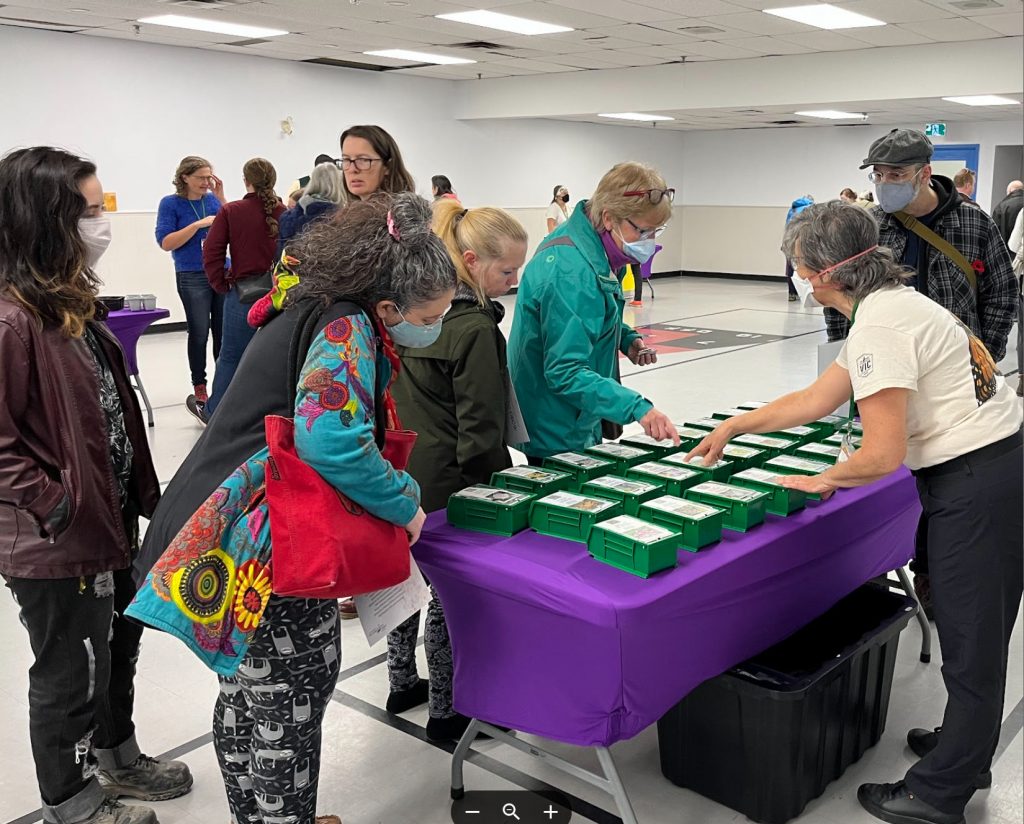By Elaine DeCoursey (modified slightly from an article written for the Old Ottawa South Community Association Review, January 2024)
At the November meeting of the Old Ottawa South Garden Club, Mélanie Ouellette gave a talk and presentation entitled “Gardening with Native Plants.” Mélanie is the chair and founder of the Ottawa Wildflower Seed Library (OWSL).
With two master’s degrees – in political science and business administration – and as manager, strategic operations at Engineers Canada, Mélanie brings a wealth of organizational expertise to this grassroots movement that promotes gardening with native plants to provide food and habitat for bees, butterflies, insects, birds and other wildlife. Between October 2022 and February 2023, OWSL provided free seeds from 177 species of native plants to more than 1300 individuals, over 16 public schools, over 23 community/butterfly gardens and six other seed libraries. This year the demand has been greater.
The organization is built on three pillars:
- Provide free access to seeds
- Teach people about gardening responsibly
- Ask seed recipients to pass on the gift of nature
OWSL distributes seeds from “straight species,” rather than cultivated varieties (cultivars) that were created and cloned to present specific characteristics. Cultivars typically have unique trade names that follow Latin names (e.g. Phlox subulata ‘Scarlet flame’).

At seed exchanges, packaged wildflower, shrub and tree seeds are sorted by species and organized into categories based on growing conditions – sun, shade, wet, dry, and combinations. Meanwhile, donated seeds are taken away, vetted to make sure they are really native, and packaged for the next event.
Plants and wildlife have been co-evolving for thousands of years, but imported plants and cultivars have been introduced faster than wildlife can adapt. Native plants are crucial to support the full life-cycle of birds and insects. For example, bird feeders are only useful for mature birds but the same birds depend on insects to feed their chicks. 96% of birds feed insects to their young. To generate enough caterpillars to feed one chickadee brood, 6000-9000 caterpillars are needed. According to Mélanie, that means at least 70% of the plants in your garden should be native species. More than 90% of moth and butterfly caterpillars eat only particular native plants or groups of native plants. Insects searching for suitable native plants have a better chance of finding them in networks of wildflower gardens.
OWSL is part of the movement led by the Homegrown National Park, a call-to-action to regenerate biodiversity and ecosystem function by planning native plants and creating new ecological networks. As the esteemed entomologist, ecologist and conservationist, Douglas Tallamy, said: “In the past, we have asked one thing of our gardens: that they be pretty. Now they have to support life, sequester carbon, feed pollinators and manage water” (Source: Homegrown National Park website).
Mélanie also recommended that gardeners “leave the leaves” and leave exposed hollow stems in the fall for overwintering insects such as cavity nesting bees. As well, tree stumps and logs can be left out to provide shelter.
Keystone species are important native plants that are part of ecosystems. Without them, an ecosystem would become dramatically different or cease to exist altogether. Keystone species in Ontario include oak, willow, maple, asters, and goldenrods. Other examples can be found by ecoregion on the National Wildlife Federation website.
OWSL’s website is an excellent resource with information on events (e.g. seed giveaways), seed catalogues, planning a garden, how to donate seeds, instructional videos and other reference material. OWSL has its own YouTube channel as well as Facebook (Ottawa Wildflower Seed Library) and Instagram (Ottawa Wildflower) pages.
Seed giveaway events are scheduled for Saturday afternoons in December. After 29 December, people can go to the OWSL website to order seeds by mail for free until the spring. The online seed catalogue is updated regularly.
Elaine DeCoursey is a member of the Old Ottawa South Garden Club, which meets monthly on the second Tuesday of each month from September to May.
Addendum: On December 5, Sundaura Alford-Purvis wrote on Facebook: “As I’m going through my seed collection, writing labels in preparation for many, many pots of winter sowing, I can’t help but wonder if all the OWSL volunteers who have worked so very hard to gather, pack and distribute seeds know how special this group is. Not only is all of your work resulting in seeds of native species getting back into places where they have been excluded for far too long, you have actually created the longest, most diverse list of Ontario and Quebec native seeds available in either province (and likely the entire Northeast).”